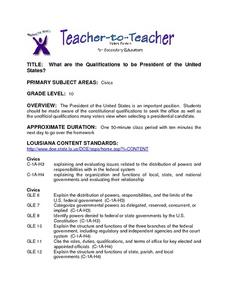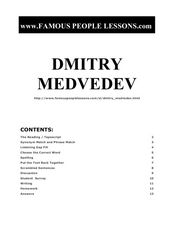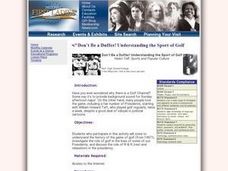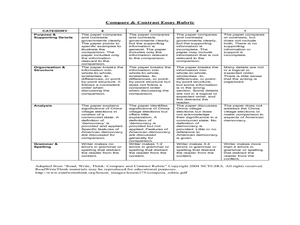Curated OER
Debating Our Destiny
Students participate in debates related to the history of the United States. In groups, they research their opinion on the purpose of debates and how a debater's posture affect the outcome of the debates. They identify the political...
National First Ladies' Library
Impeachment!
Young scholars investigate the impeachment proceedings against Andrew Johnson, Richard Nixon, and William Clinton. In small groups they conduct Internet research on one of the three Presidents, and present a "brief" on the case,...
Curated OER
Write Obama's Inaugural Address
High schoolers practice their public speaking skills. In this interdisciplinary lesson, students study speeches delivered by Lincoln, Wilson, F. Roosevelt, and Kennedy. High schoolers write the text Obama's inaugural address and deliver...
Curated OER
A Country Recovering from Crisis--Kenya
Students explore Kenya. In this Kenya lesson, students research Internet and print sources regarding the political and economic issues the country is facing. Students compare life in Kenya to life in the United States.
Curated OER
The Whole World is Watching: Iran, 2009
Students study the impact of social media. In this Iranian election lesson plan, students examine the outcome of the 2009 election and the public protests that followed it. Students determine how citizen journalism informed people around...
Curated OER
The Gettysburg Address (1863): Defining the American Union
Learners explore the Gettysburg Address. In this U. S. history lesson, students examine Abraham Lincoln's speech and it's themes of freedom, equality, and emancipation.
Curated OER
Bridging the gap between the U.S. and Cuba
Eleventh graders examine the events that led to the strained relationship between Cuba and the United States. In this US History lesson, 11th graders create an illustrated timeline of Cuba-U.S. relations. Students write an essay...
Foreign Policy Research Institute
Understanding the Koreas
Though this resource was designed in 2005, US tension with North Korea remains a relevant topic for exploration and understanding. Unfortunately, this lecture and reading-based lesson plan is unlikely to engage the class. The end product...
Curated OER
Portraits of Power: American Presidents
Ninth graders explore the presidency of George Washington and Thomas Jefferson. In this US History lesson, 9th graders examine the life of Abraham Lincoln. students write an essay describing the presidency and the people's relationship...
Curated OER
Strengthening Democracy in Africa
Students analyze democratic advances in Africa. In this global issues lesson, students research Internet, video, and print sources regarding current political developments in Africa. Students create e-collages or digital videos that...
Curated OER
The Candidate: Issues and Strategies
Students discuss the candidates image and how an image impacts the voters. In this candidates image lesson plan, students read and discuss different factors that make up the candidates image.
Curated OER
CANDIDATE COMPARISON
Learners identify the names of major contemporary political parties. They explain why a person might choose to vote for one candidate for President of the United States over another candidate. They identify the two major political...
Curated OER
Cory in the House: "New Kid in Town"
Students, after watching the program "New Kid in Town," are introduced to the White House in Washington, D.C. They explore the difficulties of fitting into a new environment along with new acquaintances. They stress and address the...
Curated OER
If I Were President?
Young scholars are ushered into the Oval Office with our patriotic Presidents Day activities. For this civics lesson plan, students explore the presidency as they research an American president and participate in up to 11 activities.
Curated OER
What are the Qualifications to be President of the United States?
Learners research the qualifications necessary to be the president of the United States. They create a want-ad for this position using what they have learned about the qualifications.
Curated OER
Limits of Power
Middle schoolers examine the importance of limiting power in governments. In this government instructional activity, students investigate the importance of placing limits on government by looking at the US Constitution. They look at ways...
Curated OER
Cuban Missile Crisis
Eleventh graders determine how causation shaped the Cuban Missile Crisis. In this Cold War instructional activity, 11th graders examine photographs and documents related to the crisis and analyze the television address that President...
Curated OER
Dmitry Medvedev
In this famous person worksheet, students read a passage about Dmitry Medvedev and then complete a variety of in-class and homework activities to support comprehension, including partner interviews, spelling, cloze, synonym matches, and...
National First Ladies' Library
Don't Be a Duffer! Understanding the Sport of Golf
Young scholars are divided into six groups to access the "History of Golf Since 1497" website, and familiarize themselves with the data on one of the six pages of the website. They then work together as a large group to construct a...
Curated OER
Democratic Village Elections in China: Comparing Governments of China and the United States
Students explore democratic practices in China. In this global studies lesson, students compare and contrast democratic values of the Chinese government with the American government. Students read provided articles and conduct their own...
Curated OER
Comparing the Satellite and Broadcast Radio Landscapes
High schoolers research the development of satellite technology over the last 50 years students explain how the enactment of the Telecommunications Act of 1996 changed the rules for corporate ownership of multiple media outlets.
Curated OER
The Right to Know
Students discuss their knowledge of the position of National Security Advisor. They read and discuss a newspaper article about national security and intelligence as it relates to terrorism and the public's right to know.
Curated OER
The Monroe Doctrine: U.S. Foreign Affairs (circa 1782-1823) and James Monroe
Students read the test of the Monroe Doctrine then list the key points and discuss its central tenets.
Curated OER
Interpreting Political Cartoons
Students review political cartoons and discuss what political impact they can have. They choose a current political cartoon and write an essay exploring its intent and impact.

























